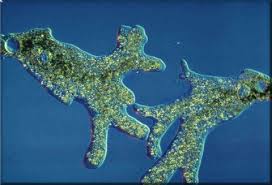Biology


- Prokaryotes Vs Eukaryotes
While eukaryotic cells and prokaryotic cells have some characteristics in common, they diverged from their common ancestor billions of years ago, thus accounting for significant differences in overall structure and function. Here we will go over them....
- Planaria Regeneration
Regeneration is when stem cells create needed body parts of an organism. Both starfish and lizards have this ability. Starfish can regrow their limbs if they are cut. Salamanders have this ability with their limbs and tails as well. Planaria regenerate...
- Stem Cells
Stems cells are unspecialized cells that are capable of continually renewing and dividing through cell division for long periods. They are also capable of differentiating into specialized cell types under appropriate conditions. Therefore the two normal...
- Prokaryotes Versus Eukaryotes
Cell Webquest ? Ms. Carter Prokaryotes versus Eukaryotes California Standard: Cell Biology 1. c Cell Biology: The fundamental life processes of plants and animals depend on a variety of chemical reactions that occur in specialized areas of the organism?s...
- #31 Control Of Cell Division, Stem Cell, Haploid And Diploid Cells
Each cell contains genes that help to control when it divides. Cells divide by mitosis only when required. When receives signals from neighbouring cells, it responds by dividing or not dividing. If this control goes wrong, cells may not divide when they...
Biology
Comparison between unicellular and multicellular organisms
| Unicellular organism | Multicellular organism |
| 1. Body is made up of single cell | Body is made up of numerous cells |
| 2. Division of labour is at the organelle level. It gives a low level of operational efficiency | Division of labour may be at cellular, tissue, organ and organ system level. It gives high degree of operational efficiency |
| 3. A single cell carries out all the life processes | Different cells are specialized to perform different functions |
| 4. The cell body is exposed to the environment on all sides | Only outer cells are specialized to face the environment. Inner cells are devoted to other functions |
| 5. An injury of the cells can cause death of the organism. | Injury or death of some cells does not affect the organisms as the same can be replaced by new one. |
| 6. A cell body cannot attain a large size because of the limit imposed by surface area to volume ratio | A multicellular body can attain a large size increasing the number of small cells |
| 7. Lifespan is short due to heavy load of work | Lifespan is long due to limited load of work for each cell type |
| 8. Power of division is not lost | Certain specialized cells lose power of division |
| 9. A well-marked capacity of regeneration is present | The capacity of regeneration decreases with increasing specialization |
| 10. The cell has the same role for itself and the organism | Cells have a double role. One for themselves and other for the organism |
- Prokaryotes Vs Eukaryotes
While eukaryotic cells and prokaryotic cells have some characteristics in common, they diverged from their common ancestor billions of years ago, thus accounting for significant differences in overall structure and function. Here we will go over them....
- Planaria Regeneration
Regeneration is when stem cells create needed body parts of an organism. Both starfish and lizards have this ability. Starfish can regrow their limbs if they are cut. Salamanders have this ability with their limbs and tails as well. Planaria regenerate...
- Stem Cells
Stems cells are unspecialized cells that are capable of continually renewing and dividing through cell division for long periods. They are also capable of differentiating into specialized cell types under appropriate conditions. Therefore the two normal...
- Prokaryotes Versus Eukaryotes
Cell Webquest ? Ms. Carter Prokaryotes versus Eukaryotes California Standard: Cell Biology 1. c Cell Biology: The fundamental life processes of plants and animals depend on a variety of chemical reactions that occur in specialized areas of the organism?s...
- #31 Control Of Cell Division, Stem Cell, Haploid And Diploid Cells
Each cell contains genes that help to control when it divides. Cells divide by mitosis only when required. When receives signals from neighbouring cells, it responds by dividing or not dividing. If this control goes wrong, cells may not divide when they...
